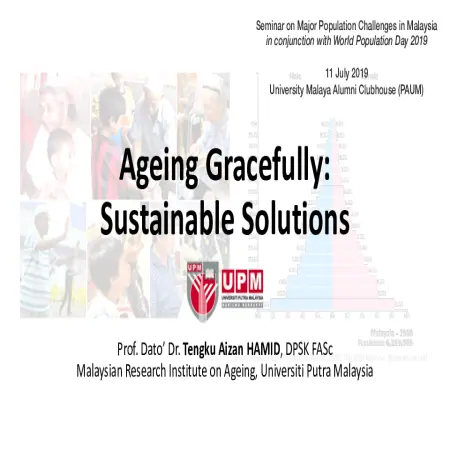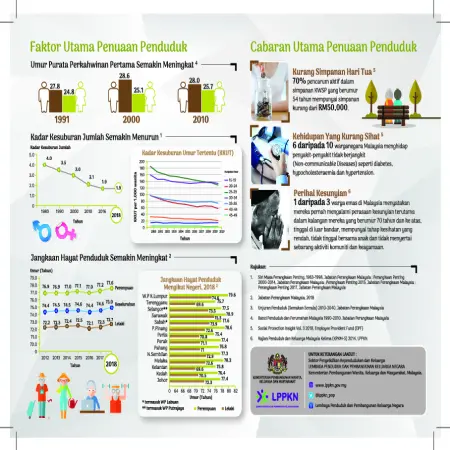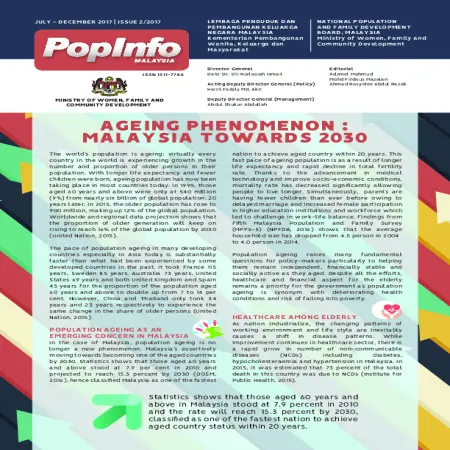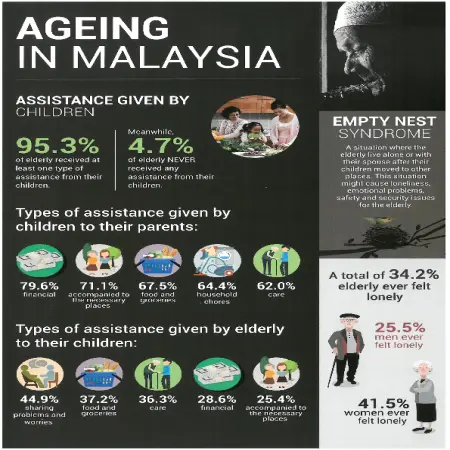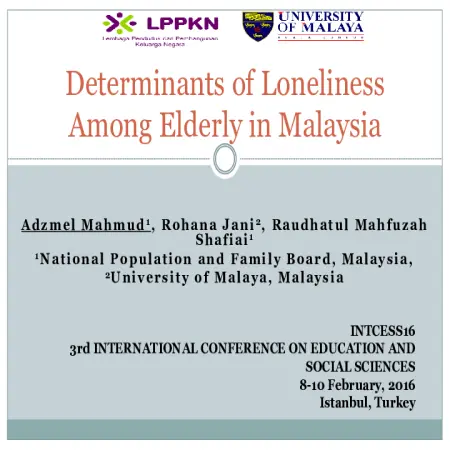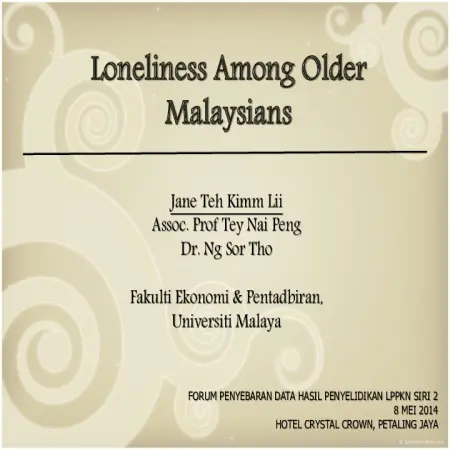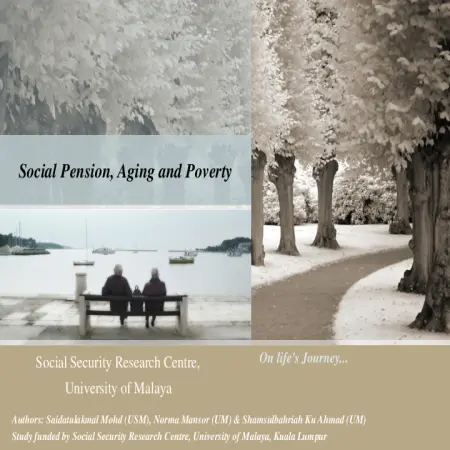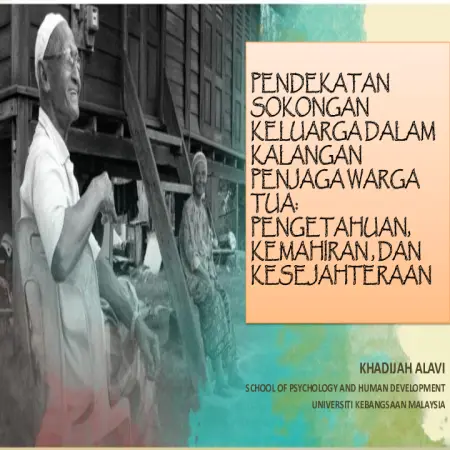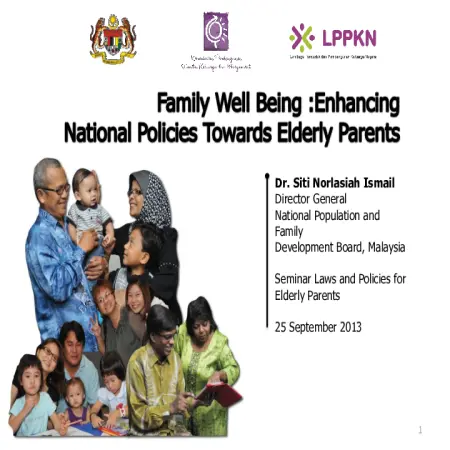TOPICS
Results for Topics : "Ageing"
|
|
Malaysia negara tua 2030
Item Type: Infographic
Editor:
Year: 00/12/2018
Abstract: This infographic shows about the main factors and challenges of aging in Malaysia. According to the United Nations (UN) definition, senior citizens are among those aged 60 and above. This definition was introduced during the “World Assembly on Aging” held in Vienna in 1982. In recognition of the elderly, the UN through Resolution No. 45/106 has also declared October 1 as International Senior Citizens Day. In Malaysia, the National Senior Citizens Day celebration has been celebrated on October 1 every year since 1992.
|
|
|
|
|
|
Ageing phenomenon: Malaysia towards 2030
Item Type: Newsletter
Editor:
Year: 00/00/2017
Abstract: Statistics shows that those aged 60 years and above in Malaysia stood at 7.9 % in 2010 and the rate will reach 15.3 % by 2030, classified as one of the fastest nation to achieve aged country status within 20 years. This fast pace of ageing population is as a result of longer life expectancy and rapid decline in total fertility rate.
|
|
|
|
|
|
Determinants of loneliness among elderly in Malaysia
Item Type: Conference or Workshop Item
Editor:
Year: 00/00/2016
Abstract: As of 2014, there is an estimated of 2.7 million elderly in Malaysia or 8.9% out of the total population of 30.3 million. Recent projections estimated that Malaysia will become an ageing nation by 2035 when 15% of the population falls into this group. As the number of the elderly population continues to grow, loneliness is becoming one of the major issues leading to impaired quality of life among elderly. Loneliness might lead to mental problems and stress among the elderly. This study attempts to examine the characteristics and influencing factors of loneliness among elderly in Malaysia. Data for this study is a sub-sample of a bigger national study gathered through the Fifth Malaysian Population and Family Survey (MPFS-5) conducted in 2014 by the National Population and Family Development Board Malaysia.
|
|
|
|
|
|
Gaya hidup wanita dan faktor risiko kanser payudara: satu kajian literatur
Item Type: Article
Editor:
Year: 00/00/2015
Abstract: Breast cancer is currently the most common cancer in women worldwide. It is said that there is no proven method of preventing cancer. However, studies have shown that there are some women’s lifestyle factors that have been scientifically shown to increase the risk of breast cancer. A review of the literature from the epidemiological, medical, and psychosocial disciplines strives to analyse factors that tend to increase the risk of developing breast cancer. Published material reviewed concerning the connection between breast cancer risk and lifestyle factors such as diet and physical activity. This review shows that several women’s
lifestyle factors have been regularly considered as risk factors for developing breast cancer. They include women who have not had children or women who had their first child at an older age, short duration of brestfeeding or not breastfeed at all, diet and nutrition, and psychological stress.
|
|
|
|
|
|
Loneliness among older Malaysians
Item Type: Conference or Workshop Item
Editor:
Year: 00/00/2014
Abstract: Loneliness is a prevalent issue among older persons and it is an important indicator of their subjective well-being. Persistent loneliness or extreme cases of loneliness may lead to higher risks of psychological disorder, mental health problems, depression or suicide. Family support is a great importance in determining the quality of life and well-being of older persons. The objective of this study is to examine factors influencing the feeling of loneliness among older Malaysians. We hypothesize that loneliness among older persons varies according to their socio-demographic characteristics and is affected by their health and physical condition and community participation as well as the various forms of family support.
|
|
|
|
|
|
Social pension, aging and poverty in Malaysia
Item Type: Conference or Workshop Item
Editor:
Year: 00/00/2014
Abstract: The increasing number of elderly in Malaysia calls for a more stringent policy to safeguard the well-being of the elderly. The old age protection such as the pension scheme, Employees Provident Fund and the old age cash assistance although in tact, deemed to be inadequate to eradicate elderly poverty. One possible solution to secure financial protection during old age is through social pension that provides non-labor income for the retirees or elderly with the purpose of preventing or reducing elderly poverty. This paper attempts to estimate the financial cost of social pension scheme and quantify its potential role in reducing elderly poverty in Malaysia. The financial cost of social pension scheme was calculated as a percentage to GDP. By using the 2009 household income expenditure survey, the paper estimated the potential roles of social pension in eradicating elderly poverty. Sensitivity analysis indicated that the cost social pension could be kept at an average of 1.30 percentage of GDP. The 2009 HIES data also indicated that poverty could be eventually be eradicated with social pension while cost of the social pension was kept at reasonable levels.
|
|
|
|
|
|
Pendekatan sokongan keluarga dalam kalangan penjaga warga tua: pengetahuan, kemahiran dan kesejahteraan
Item Type: Conference or Workshop Item
Editor:
Year: 00/00/2013
Abstract: This study is conducted in line with global development (modernization) the impact on the care of elderly parents in their own (informal) families is declining and may worsen in the future. This phenomenon does not only occur in Malaysia but it is a global issue especially in developed and developing countries. Among the causes of this phenomenon are due to the increase in life expectancy of elderly parents (Department of Statistics Malaysia, 2000), the effects of modernization and changes in family structure, increase in divorce rates, reduction in birth rates, geographical movements and globalization.
|
|
|
|
|
|
Family well being: enhancing National Policies towards elderly parents
Item Type: Conference or Workshop Item
Editor:
Year: 00/00/2013
Abstract: Malaysia will be aged by the year 2030. The objective of National Policy for Older Persons, 2011 is to enhance the respect for and self-worth of the elderly in family, society and nation, to develop the potential of the elderly so that they remain active and productive in national development and to create opportunities for them to continue to live independently and to encourage the establishment and the provision of specific facilities to ensure the care and protection of the elderly.
|
|
|
|





